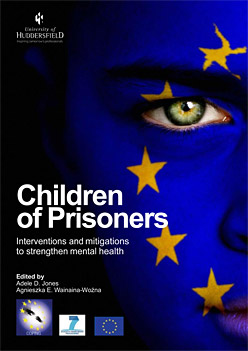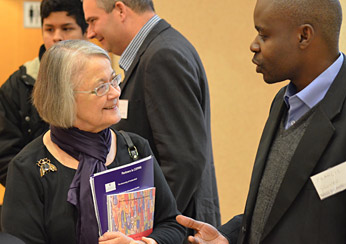Children of prisoners more vulnerable to mental health problems
Wed, 09 Oct 2013 15:59:00 BST
COPING Project findings call on government, police and justice system to do more for children with a parent in prison
 BBC coverage of the COPING Project
BBC coverage of the COPING Project
Government, police and judicial agencies are failing to recognise the needs of over 800,000 vulnerable children. This is the stark message of a 2.8 million Euro, pan-European project that has just been released.
The three-year, EU-funded project Children of prisoners, interventions and mitigations to strengthen mental health – the COPING Project – studied children with an imprisoned parent to understand their emotional needs and vulnerabilities to mental health problems. The study suggests that children with a parent in prison may be up to 2½ times more likely than other children to experience mental health problems, however many young people are neglected by the system and suffer social stigma and other social disadvantages.
 The COPING project, led by the University of Huddersfield and funded under the EU’s Framework 7 Programme, makes a number of recommendations, in particular calling for more priority to be given to the needs of the child throughout the criminal justice process from initial arrest through court proceedings and subsequent incarceration of the parent, as well as increased support from education and social services.
The COPING project, led by the University of Huddersfield and funded under the EU’s Framework 7 Programme, makes a number of recommendations, in particular calling for more priority to be given to the needs of the child throughout the criminal justice process from initial arrest through court proceedings and subsequent incarceration of the parent, as well as increased support from education and social services.
Launched in 2010, the three-year research project centred on four countries, the UK, Sweden, Germany and Romania, and the aim was to investigate common difficulties across the four countries that young people face when their parents are in prison and to crucially highlight ways to improve their lives.
Key recommendations from the newly-released study include the need for police to consider home search and arrest procedures from the child’s perspective and for policy that recognises contact as the right of the child rather than as a privilege to be earned or removed from the imprisoned parent.
Project leader Professor Adele Jones (pictured right), the Director of the Centre for Applied Childhood Studies from the University of Huddersfield, explained: “The initial arrest or search by the police in the home can be particularly distressing for a child. And it was the simple insensitivities that the group found most disturbing, like the door being broken down in a forced entry or the use of handcuffs to restrain the parent. Children were rarely given an explanation as to what was happening and no opportunity was offered for parents to explain or say goodbye. Trauma is exacerbated on occasion by the destruction of the children’s personal items and toys in the search for drugs.”
The report also calls for the children’s interests to be represented in judicial discussions and for priority be given to who will look after the child after sentencing and to which prisons are at a reasonable distance from the affected child’s home. The project also found that the restrictions on physical contact between the imprisoned parent and visitors was one of the main causes of concern for the children, in particular the very young.
Professor Jones added: “The psychosocial impact on children is little known and rarely considered in sentencing even though the evidence, to date, suggests that children whose parents are imprisoned are exposed to triple jeopardy through break-up of the family, financial hardship, stigma and secrecy, leading to adverse social and educational repercussions. The United Nations has now been persuaded that children of prisoners should be a high priority for special attention and they have been added to UN’s target list as a one of the more vulnerable groups of children in the world.
“We would like to see the UK Government adopt a similar position. At this point in time, there is no official body that has responsibility for these children, even though there are more children affected by parent imprisonment than divorce or parental death and we would like to see the UK acknowledge their vulnerability and act to help them.
Diane Curry OBE, CEO of Manchester-based Partners of Prisoners and Families Support Group (POPS), said: “The COPING research findings provide concrete evidence that many prisoners’ children face a higher risk of developing mental health issues and of experiencing lower self-esteem. However, we also know that if the issues faced by these children are recognised and they are properly supported that this can mitigate against the negative impact that the imprisonment of a parent or carer can bring.
“POPS will use the findings and recommendations from COPING to inform schools, health agencies and the general public about the importance of providing Prisoners’ children with the right to be recognised, listened to and supported.”
_____
The COPING Project
 Pictured left is Baroness Brenda Hale, Justice of the Supreme Court of the United Kingdom and patron of the COPING Project at the Brussels COPING conference.
Pictured left is Baroness Brenda Hale, Justice of the Supreme Court of the United Kingdom and patron of the COPING Project at the Brussels COPING conference.
The COPING Project was funded by the European Union (Seventh Framework Programme, Health Theme) and the project members are very appreciative of the fact that the EU identified this as an important area of research. Led by Professor Adele Jones at the University of Huddersfield, COPING was carried out by a consortium comprising six non-governmental organisations and four research institutions from, France (European Network for Children of Imprisoned Parents, Eurochips), Germany (Technische Universitaet, Dresden and Treffpunkt e.V.), Romania (Universitatea Alexandru Ioan Cuza and Asociatia Alternative Sociale), Sweden (the Karolinska Institutet and Bryggan), Switzerland (Quaker United Nations Office, Geneva) and the UK (the University of Huddersfield (project lead) and Partners of Prisoners and Families Support Group, POPS).
The Project received expert advice and support from the International Advisory Board:
- Anne Mace OBE, Chair of Board of Trustees, Together Women Project - formerly Chief Probation Officer for West Yorkshire, UK
- Professor James McGuire, Professor of Forensic Clinical Psychology at the University of Liverpool, UK
- Professor Susanna Mantovani, Vice-Rector University of Milano-Bicocca, Italy
- Professor Johanna Schiratzki, Professor of Law, Stockholm University, Sweden
- Dr Miranda Wolpert, Director of the Child and Adolescent Mental Health Service, Anna Freud Centre, University College London, UK
The COPING Project would like to thank its Patrons for their support:
- Sir Patrick Stewart OBE, internationally-renowned actor and Chancellor of the University of Huddersfield
- The Right Honourable, The Baroness Hale of Richmond (DBE), Justice of the Supreme Court, UK
- Lemn Sissay MBE, international poet, playwright and children’s rights activist







